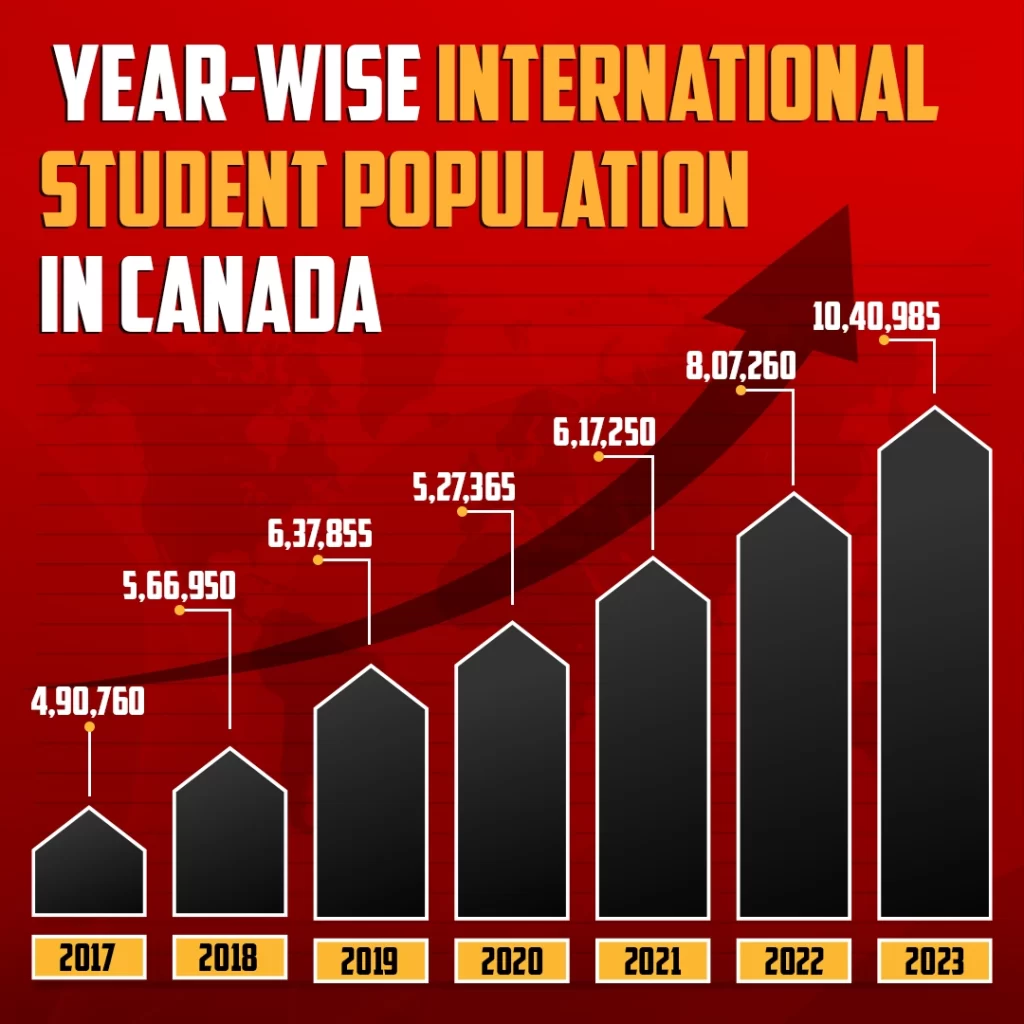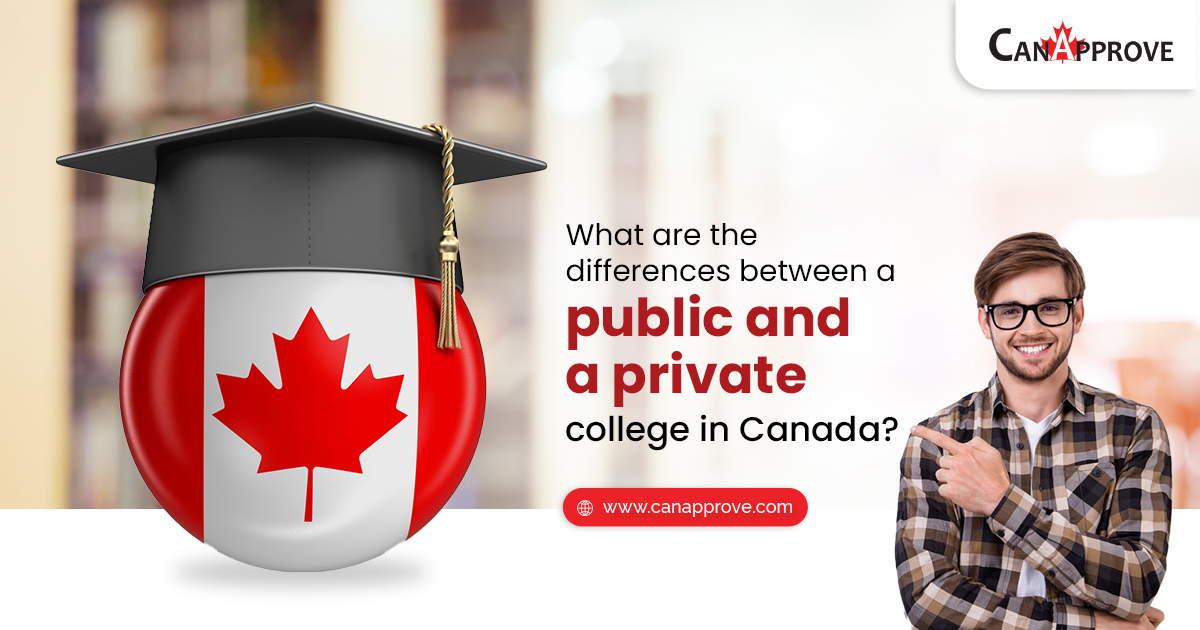Table of Content
1 Difference between public and private colleges in Canada 2 Public College Vs Private College 3 Top Private and Public Colleges in Canada 4 Private Institutions in Canada 5 Advantages of Studying Private Colleges in Canada 6 Public Institutions in Canada 7 Advantages of Public Institutions in Canada 8 Placement and Stay Back 9 What Next? 10 Frequently Asked Questions
Difference between public and private colleges in Canada
You might have read or heard the words ‘private college and public college’ frequently if you are a student planning for overseas education in Canada. But have you ever thought about what are those and what are the prime differences between those two?
Yes, one might simply say that a private college is an institution for which someone or a corporate group other than the government takes ownership. On the other hand, a public college is a government undertaken institution that comes under the direct control of federal education regulatory bodies. That’s right!
However, there are other important differences between these public and private colleges that you should know before delving into the Canada overseas education process. Choosing between a public and private college can be a bit confusing to determine which type of institution best serves your purpose of study.
Hence, you’ve got this blog to get some better insight into the above context.
Public College Vs Private College
Public colleges are run by the government which means they are funded by the government and the public while private colleges do not have any means of monetization to operate other than the tuition fees.
International students who choose to pursue higher education overseas often end up in Canada, regardless of the type of institution they select, whether it is a public or a private one. This can be inferred by the following graph, which depicts the enrolment of international students.

Let us delve a bit more of the differences between the public and private colleges.
Some of the major differences between private and public colleges are in terms of,
- Tuition Fees
- Education & Programs offered
- Class size
- Career Opportunities
- Academia
- Diversity Factor
Tuition Fees
Private colleges may be more affordable than public colleges, and there is not much deviation in terms of tuition fees for international students and domestic students. Both are likely to be the same. There are scholarships offered to international students too when an exemplary academic portfolio is substantiated. The scholarship may support your tuition costs, study materials, and boarding. This justifies the private college’s affordability.
Public colleges are usually cheaper for domestic students, whereas international students should pay the full fees.
However, one can apply for a scholarship to have a part of the fee exemption.
(Note: even though public colleges are run by the government, some institutions will include the university operational charges (maybe a part of it!) in the student funding.)
Education & Programs Offered
Private institutions equally perform to that of public institutions. Both are well-staffed and have an excellent way of teaching that directly influences the lives of program participants.
It’s just that in private institutions, the programs offered could be more limited. On the other hand, public colleges offer a broader range of programs and may offer more research opportunities.
The following lists out the top programs desired by international students.
- Information Technology
- Engineering
- Business Management
- Law
- Psychology
- Computer Science
- Arts
- Hotel Management
- Medical
- Journalism
Class Size
Public colleges are generally massive, with large classrooms and a huge student count. This may lead to less staff-student interaction. However, there are some colleges with compact classrooms as well. Conversely, private colleges generally have small classrooms and a limited student count which has a close staff-student interaction.
Career Opportunities
There are prospective job opportunities for international students in private and public colleges. International students studying in public colleges can work part-time but those studying in private colleges will not have the provision to work part-time. However, these students happen to work but will be paid in the cash-in-hand method instead of having a payroll process like those studying in public colleges.
Academia
Public colleges will be operating in various places throughout the province or even in different provinces as they receive funds from the government and the public. Unlikely, private colleges are run by corporates or a person, or a group of members, and the operating process solely depends upon the tuition fees of the students and none other than that.
So, there are financial limitations for private colleges to act in various places, while public colleges have offshoots in various places in the country.
Diversity Factor
Public Colleges in Canada tend to be larger with a diverse student population, offering a broad range of extracurricular activities and resources. On the other hand, Private Colleges in Canada might have a smaller, more close-knit community, potentially providing more personalized attention and support.
Top Private and Public Colleges in Canada
The colleges in Canada are vast in number which leads to confusion among students. Here is the list of top Public Private colleges in Canada
| Private Colleges/Universities | Public Colleges/Universities |
| Toronto School of Management | University of Toronto |
| Canadian Business College | Humber College |
| Tyndale University | Angloquin College |
| Oxford College of Arts, Film and Technology | Centennial College |
| Yorkville University | University of Waterloo |
Even though the list was given, it would be better if we went in detail for better understanding. So, the upcoming two topics will explain the public and private institutions in Canada comprehensively.
Private Institutions in Canada
From the above differences, we can understand that private colleges/universities in Canada rely on tuition fees, endowments, and donations. Despite their setbacks, they perform equally with the public universities on several factors, such as success rate, admissions rate, and so on. Some of the notable institutions are as follows
1. Toronto School of Management (TSOM):
Toronto School of Management is a recognized and accredited institution that offers programs in various disciplines such as business, management, and finance. Joining TSOM would be an ideal choice for students to kickstart their career in the world of corporates. The features of TSOM would be
| Features | Details |
| Types of programs offered | Diploma, Advanced Diploma, Post Graduation |
| Courses offered | Business Management, Accounting, and Hospitality |
| Average Tuition Fees | Varies by programme |
| Eligibility Criteria | TOEFL/IELTS and program-specific requirements |
| Intake of Students | September-May |
2. Canadian Business College (CBC):
Founded in 1992, CBC is one of the leading institutions in Canada dedicated to delivering high-quality education. Choosing CBC is an excellent choice for those seeking practical skills and quick entry into the workforce. The features are as
| Features | Details |
| Types of programs offered | Diploma and Certification |
| Courses offered | Business, Healthcare, Technology, Law |
| Average Tuition Fees | Varies depends upon the duration of the program |
| Eligibility Criteria | TOEFL/IELTS; 18-yrs or older; program specific norms |
| Intake of Students | September-May |
3. Tyndale University:
Tyndale University was established in 1982 with a commitment to academic excellence and spiritual formation and to provide a supportive and enriching knowledge environment. The key features are as follows
| Features | Details | |
| Types of programs offered | Undergraduate and Graduate programs | |
| Courses offered | Arts, Education, Theology, Business | |
| Average Tuition Fees (approx.) | Undergraduate (CAD/academic year) | Graduate (CAD/academic year) |
| Domestic | 8000-12000 | 10000-20000 |
| International | 15000-25000 | 15000-30000 |
| Eligibility Criteria | Program specific norms | |
| Intake of Students | September-May | |
4. Oxford College of Arts, Film and Technology:
Oxford College of Arts, Film and Technology is a renowned prestigious institution known for its excellence in its curriculum. With a rich history and a commitment to fostering creativity and innovation, the college provides a dynamic learning environment where students can explore their passions and develop their skills. The key features are
| Features | Details |
| Types of programs offered | Undergraduate & Graduation |
| Courses offered | Film Studies, Visual Arts, Creative Writing |
| Average Tuition Fees | Program specific |
| Eligibility Criteria | Diploma Certification; Portfolio; Letter of Recommendation; Program-specific norms. |
| Intake of Students | Annual basis |
5. Yorkville University:
Yorkville University is a public university which was established in 2003. It offers practitioner-oriented degree programs for a professional career to individuals worldwide. The main aspects are as follows
| Features | Details |
| Types of programs offered | Under Graduation & Graduation |
| Popular Courses | BBA, Bachelor of Interior Design, MA in Counselling Psychology |
| Average Tuition Fees | 22000 CAD/year |
| Eligibility Criteria | Program-specific |
| Intake of Students | September – May |
Advantages of Studying Private Colleges in Canada:
- Holistic Education: Private colleges focus not only in education but also in student development such as leadership, communication by allowing them to engage in other extra-curricular activities.
- Flexibility: Private colleges offer different mode of education such as evening college, online and hybrid as per the need of the student.
- Up-to-date Curriculum: Private college keen on updating their modules in line with the needs of industrial standards.
- Industrial Connections: Private college holds a strong industrial connection for their student’s smooth transition from education to employment.
- Support systems: Private colleges have a dedicated support systems for their international students.
Public Institutions in Canada:
Unlike Private institutions, public institutions in Canada are a bit economical to domestic and international students.
As a result, the performance of public institutions is regularly increasing every academic year. Some of the renowned public institutions are
1. University of Toronto:
The University of Toronto stands as a global leader in research, renowned for its commitment to fostering innovation.
It is one of the few universities in Canada that has been listed under QS World Rankings. Some of the features are –
| Features | Details |
| Types of programs offered | Undergraduate and Graduation |
| Popular Courses | Civil, Nursing, Business Administration |
| Average Tuition Fees | CAD (13650-63768) |
| Eligibility Criteria | Program specific |
| Intake of Students | September-May |
2. Humbler College:
The Humbler College Institute of Technology and Advanced Learning, also known as Humber College, is known for its wide variety of courses provided across 40 different fields. These programs guide you into a specialized degree with a definitive career path. The skill development opportunities here are practically endless. Some of the features are
| Features | Details |
| Types of programs offered | Undergraduate and Graduation |
| Popular Courses | Technology, Nursing, Arts & Media Design |
| Average Tuition Fees | CAD (12000-35000) |
| Eligibility Criteria | HSC (70%) IELTS (≥6) / TOEFL (≥90) |
| Intake of Students | September – May |
3. Angloquin College:
Angloquin College, established in 1967, is one of Canada’s largest colleges. The college is known for its diverse areas of studies and application-oriented-on-job training. Also, the student-oriented atmosphere and multicultural ethos for an exceptional learning atmosphere. Some of the features are
| Features | Details |
| Types of programs offered | Diploma, Undergraduate, and Graduation |
| Popular Courses | Business Administration, Computer Science, Engineering, Media & Communications |
| Average Tuition Fees | CAD (16,000-30,000) |
| Eligibility Criteria | Diploma: HSC (≥60%); IELTS (≥6.0) |
| UG: HSC (≥65; with minimum 60% in particular subjects); IELTS (≥6.5) |
|
| Graduation: CGPA (≥55%); Academic IELTS (≥6.5) |
|
| Intake of Students | Academic Year |
4. Centennial College:
Centennial College was established in 1966 and it is one of the most popular government colleges in Canada. The college is known for its deep immersion in the industry. This immersion keeps the courses up to date with the latest trends. Other notable features are
| Features | Details |
| Types of programs offered | Undergraduate |
| Popular Courses | Paramedicine, Journalism, New Media studies |
| Average Tuition Fees | CAD (16,000 – 35,000) |
| Eligibility Criteria | Ontario Secondary Diploma (OSSD) or Equivalent |
| Intake of Students | Academic Year |
5. University of Waterloo:
The University of Waterloo is known for its renowned globally for its innovative approach to education and its strong emphasis on exceptional learning, cooperative education, and research excellence. Some of its highlights are
| Features | Details |
| Types of programs offered | Undergraduate & Graduation |
| Popular Courses | Engineering, Computer Science |
| Average Tuition Fees | CAD (45,000-66,000) for two terms |
| Eligibility Criteria | IELTS/TOEFL; Program specific norms |
| Intake of Students | September – August |
Advantages of Public Institutions in Canada:
- Affordability: Public universities/colleges in Canada tend to be more affordable than Private institutions since it is government funded. Also, there are certain financial aid such as scholarships which will reduce the tuition fee even down.
- High-Quality Education: The Public Universities secure their place in QS World Rankings because of their quality education and research opportunities.
- Global Recognition: Graduates from public colleges in Canada are respected worldwide. This respect benefits the graduates to seek employment or to pursue further education.
- Quality of Life: Canada topped in other aspects such as healthcare, transportation, and well-being. Studying in a Canadian Public Institution offers students to experience the quality of life firsthand.
- Pathway to Residency: Studying in a Canadian Public Institution would become the first step towards getting a Permanent Residency (PR) in Canada.
Placement and Stay Back:
Both public and private colleges in Canada offer placement assistance for international students. However, what is to be noted is, students from public colleges get to stay back through the post-graduation work permit (PGWP). Even though a candidate failed to grab a job through college placement, he or she can breathe and search for one while staying back.
In addition, private college students too have post-study stay-back period but not all private colleges are eligible. The course must meet the specific criteria for PGWP. The following illustrates the number of international students who received the PGWP in 2022 country-wise.
| Foreign Nationals with PGWP (Country-wise) | |
| India | 3,19,000 |
| China | 1,00,010 |
| Philippines | 32,425 |
| France | 27,110 |
| Nigeria | 21,645 |
| Iran | 21,105 |
| Republic of Korea (South Korea) | 16,500 |
| Vietnam | 16,130 |
| Mexico | 14,920 |
| United States | 14,465 |
Private colleges have an equal number of tie-ups and associations as public colleges with top government and private firms in hiring. So, there are great placement possibilities for you and one thing you must be truthful to yourself is that you will put in the efforts that you are supposed to.
What Next?
From the list of above differentiated public private colleges in Canada, we believe that the basic knowledge and facts was established. These facts will act as a foundation for your search for college selection in Canada. Also, these details offer understanding and direction for looking the precise information to be aware of.
Still stuck in choosing the right college. No worries. Our education coordinators at CanApprove are always available to walk with you through the overseas education process. Get enlightened about colleges, universities, and suitable programs along with profile evaluation in just a call or a message. You will have the promised response in no time. Connect now & thanks for reading!!
Share this with your friends, family, or acquaintances who really are passionate about studying overseas…
Frequently Asked Questions:







